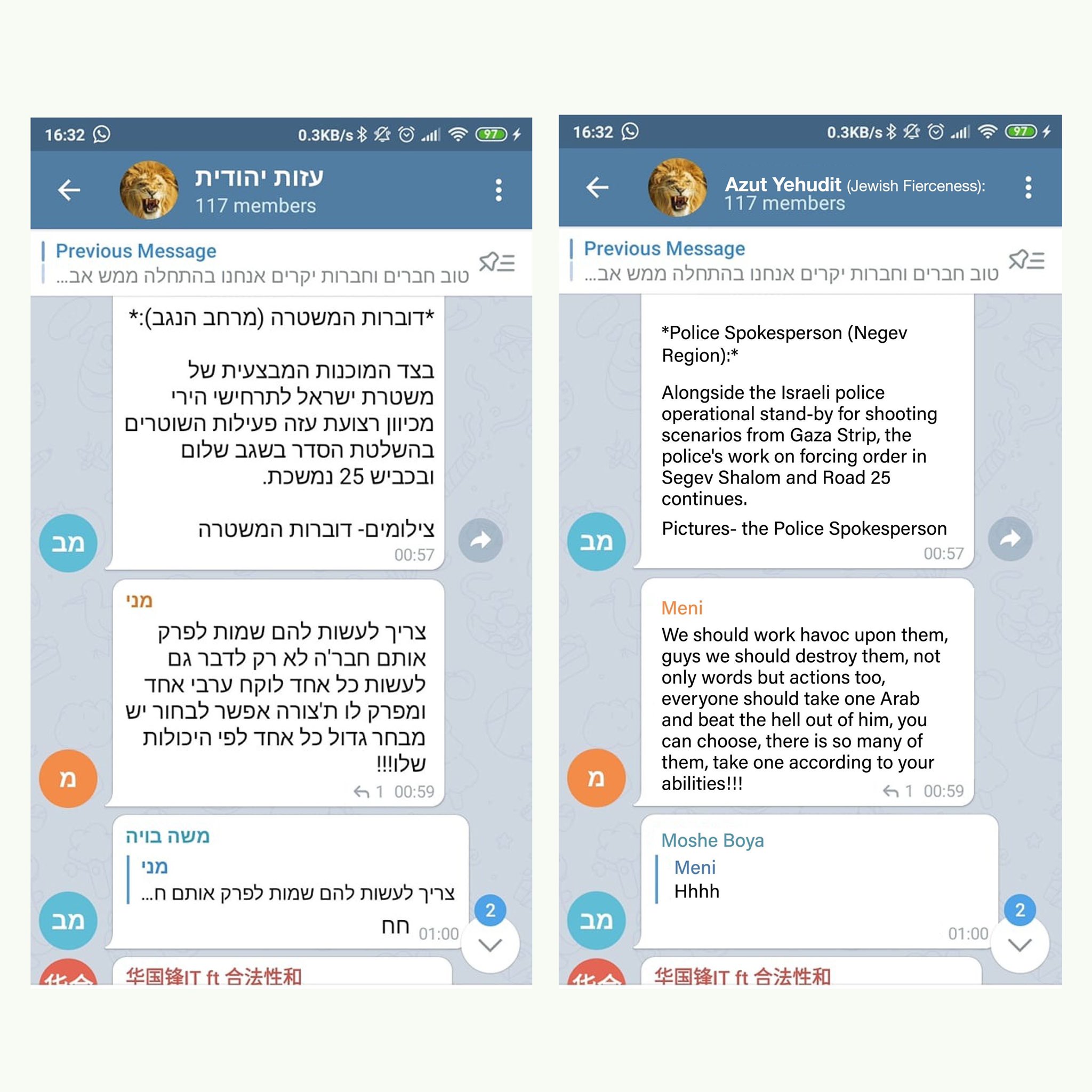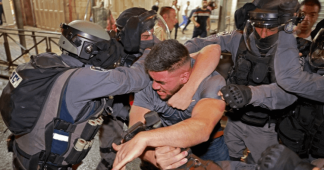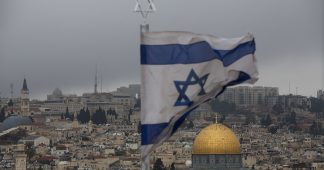As ceasefire agreed, tech giants come under spotlight over censorship, disinformation and manipulation concerns from past two weeks
Rayhan Uddin
21 May 2021
During the recent violence in Israel and the occupied Palestinian territories, social media has proven to be a double-edged sword.
A ceasefire came into effect at 2am on Friday morning, but not before a devastating escalation in which Israeli air strikes on Gaza killed at least 243 Palestinians, including 66 children, and rockets fired from the besieged Palestinian enclave killed 12 people in Israel. In the occupied West Bank and East Jerusalem, 29 Palestinians were killed.
Over the past two weeks, the digital sphere has taken centre stage. It gave a space for direct, unfiltered documentation of the realities on the ground, a means for disseminating information in many different forms and formats, and a platform for amplifying messages and gestures of solidarity.
But where there has been good use, there has also been abuse.
Tech giants have come under intense scrutiny, finding themselves accused of censoring Palestinian content, of failing to crack down on disinformation, and allowing the incitement of violence. Platforms were also manipulated and used as vehicles of state propaganda.
Middle East Eye breaks down five ways in which digital communications platforms were misused and mishandled as protests and violence escalated in Israel, Gaza, the occupied West Bank and occupied East Jerusalem.
Palestinian censorship
The violence and brutality of recent days have been accompanied by repeated examples of content restrictions and removals on social media.
It started off with the campaign to resist the imminent eviction of six families in the occupied East Jerusalem neighbourhood of Sheikh Jarrah – the catalyst of the recent crackdown on protests by Israeli forces – which found itself at the heart of censorship accusations.
Middle East Eye reported on 7 May that concerns had been raised about deleted social media content and account suspensions in relation to the neighbourhood.
Mona el-Kurd, a journalist and Sheikh Jarrah resident who faces eviction from her family home, briefly had her Instagram account suspended as she documented daily abuses taking place. Her brother Mohamed el-Kurd also had content removed over alleged “hate speech”, even though he said he was simply filming police violence with no text commentary.
Sheikh Jarrah residents complained of their Instagram stories receiving less engagement and fewer views for unexplained reasons. Meanwhile, over at Instagram’s parent company Facebook, the over 130,000 member group “Save Sheikh Jarrah” was temporarily disabled for “going against community standards”.
Questions were also raised on Twitter when Palestinian journalist Mariam Barghouti’s account was suspended while she was reporting from a Sheikh Jarrah solidarity demonstration in the occupied West Bank. Twitter later told Vice that the decision was taken by accident – though it failed to clarify what specific part of its terms of services it initially believed Barghouti had breached.
“The restrictions and censorship have a far reaching impact on people’s ability to communicate, to organise and to share information,” Marwa Fatafta, Middle East and North Africa policy manager at Access Now, told MEE.
“When you are locked out of your account or your content is being removed, clearly this violates your ability to exercise your right to freedom of expression online.”
The restrictions went beyond Sheikh Jarrah activism. As Israeli police moved into al-Aqsa Mosque to brutally crack down on worshippers praying during the last days of Ramadan, censorship allegations followed.
On Instagram, the hashtag “Al-Aqsa” was temporarily hidden, because there were reports of “some content that may not meet Instagram’s community guidelines,” according to the notification users received.
Facebook, which owns Instagram, blamed content takedowns on an “a widespread global technical issue not related to any particular topic”.
However, it appears the hashtags were blocked because the platform’s content moderation system mistakenly associated al-Aqsa – the third holiest site in Islam – with a terrorist organisation, according to internal employee communications seen by Buzzfeed.
Aside from the “glitch”, another possible reason for some content removal could be use of the word of “Zionist”.
A report by The Intercept found that Facebook’s policy to remove content which used the word Zionist synonymously with “Jew” or “Judaism” was proving difficult to implement. The guidelines left “very little wiggle room for criticism of Zionism”, according to one of the platform’s own moderators.
Amid all the concerns from Palestinian activists, it was the Israeli government who met last week with senior TikTok and Facebook executives. Justice Minister Benny Gantz urged the social media corporations to remove violent content and to respond quickly to appeals from Israel’s cyber bureau.
The Israeli cyber unit, which operates within the justice ministry, systematically surveils Palestinian content and feeds back to tech giants. According to a report released by Palestinian digital rights organisation 7amleh, Facebook accepted 81% of requests made by the cyber unit to remove content.
“This is evidence to confirm that the digital discrimination that we Palestinians are exposed to in the digital space is not a technical glitch,” Mona Shtaya of 7amleh told MEE. “But rather the result of systematic efforts by the Israeli authorities to silence the human rights activists’ voices and to influence the tech companies policies related to content moderation”.
A coalition of digital rights organisations have called on Twitter and Facebook to provide detailed data on requests submitted by the cyber unit and to be transparent on its decision making process regarding content removal.
In addition, a Palestinian data rights group, two news agencies and a translator have filed a legal complaint with Facebook, accusing it of censoring their posts and, in some cases, shutting down their accounts in violation of the company’s own policies.
The 14-page complaint, sent to the UN Special Rapporteur on Freedom of Opinion and Expression and seen by Middle East Eye, gives the company 21 days to explain why posts and accounts were shut down until further action, including potential litigation, is taken.
Disinformation and fake news
Millions around the world have relied on social media sources to inform them about the violence in Israel-Palestine, however not all content – including that from officials – has been accurate.
In perhaps the most high profile case of spreading disinformation regarding the scenes in Gaza, the Israeli prime minister’s official Arabic spokesperson, Ofir Gendelman, shared a video he claimed showed Hamas firing rockets into Israel. The clip was in fact from 2018, and showed missiles being fired in Syria’s Daraa governorate.
The tweet was initially labelled as “manipulated media” by Twitter, before Gendelman deleted it.
The Israeli military’s official Twitter account has also spread misinformation. The Israeli Defence Forces (@IDF) account shared a clip which purported to show Hamas embedding missile launchers into civilian neighbourhoods. However, the footage actually showed a decoy weapon used by Israel during a training exercise in the northwest of the country.
At 0:18 of this clip, the IDF show a "missile launcher" that Hamas supposedly embeds into civilian neighborhoods. It's actually a decoy weapon used by the Israeli military, and was filmed in northwestern Israeli.
(great eye from @razhael)Source: https://t.co/Tr1vXm5wHP https://t.co/2hIAWsziZ7 pic.twitter.com/BbNUUFOekC
— Aric Toler (@AricToler) May 16, 2021
The video was reshared by verified Twitter account “Stop Antisemites”, which later apologised for the misinformation. In the apology, it provocatively insisted on labelling the actual footage as having come from “a Muslim majority neighbourhood”, in what appeared to be a clear attempt to link an Israeli weapon with Palestinians.
“The Israeli authorities usually use misinformation and fake news as an essential part of their propaganda,” said Shtaya. “This type of information greatly affects people’s consciousness and the Palestinian political movements.”
According to 7amleh, 54% of survey participants in its “Fake News in Palestine” report identified Israeli authorities as the main source of fake news. The research also found that there was a 58% rise in fake news during Israeli attacks on Palestinians.
Other instances of disinformation spreading online included false reports that Palestinians had faked a Gaza funeral ceremony in an attempt to attract global sympathy.
The fake video, which was shared by an adviser to the Israeli foreign ministry, Dan Poraz, showed a group of teenagers supposedly carrying a “body”. When loud sirens are suddenly heard, the teenagers – including the “body” – all disperse and run away. The footage was in fact taken last year in Jordan by a group of youths trying to avoid Covid-19 restrictions by pretending to hold a funeral.
Poraz shared the video with the hashtag “Pallywood”, a much-maligned concept which right-wing pro-Israel advocates coined in a cynical attempt to accuse Palestinians of dramatising their suffering to curry international favour
Another example of social media users peddling fake news to associate people in Gaza with “Pallywood” involved sharing a video which purported to show Palestinians applying make-up to fake injuries caused by Israeli attacks. The clip, shared last week, could in fact be traced back to 2018, and was part of a news report about Palestinian make up artists.
Pro-Palestinian misinformation has also emerged in recent weeks. The New York Times reported that Arabic media had falsely associated a clip showing Jews tearing their clothes as a sign of devotion with claims that they were faking injuries in Jerusalem. The NYT found that the video in question had been circulated several times earlier this year.
Meanwhile, a widely shared Facebook post purporting to show a journalist crying while capturing scenes outside al-Aqsa, was in fact an Iraqi photographer during a football match in 2019.
Israeli propaganda
Israeli official social media accounts, in particular those associated with the military, have been utilised over the past two weeks to share highly provocative, often incendiary, propaganda messages.
Last Wednesday, the military’s Hebrew Instagram account used the “before” and “after” meme format to brag about how it had destroyed an apartment building in Gaza.
The @IDF Twitter account has also repeatedly shared images of buildings it has bombed in Gaza, including a building that housed Al Jazeera, the Associated Press and Middle East Eye journalists. The images are almost always accompanied by claims that the buildings harboured Hamas military intelligence assets, with no evidence to back up the assertions.
After providing advance warning to civilians & time to evacuate, IDF fighter jets struck a multi-story building containing Hamas military intelligence assets.
The building contained civilian media offices, which Hamas hides behind and deliberately uses as human shields. pic.twitter.com/zeDjEquePD
— Israel Defense Forces (@IDF) May 15, 2021
Last week, the Israeli military announced on Twitter that ground forces had begun “attacking in the Gaza Strip”, as part of a wider campaign in which it briefed international media that a ground invasion was underway. However, Israeli media later reported that the tweet and briefings were part of a deliberate attempt to dupe Hamas fighters into thinking an invasion was underway and expose them in greater numbers.
The IDF account also blamed power cuts – which have been a problem in Gaza for years because of the blockade – on Hamas, and its Farsi account doctored a photo of the Iron Dome defence system to make it look like a Star of David.
Using social media in such a deceptive way has led many to accuse the Israeli military of misusing its official platforms, and of “live tweeting war crimes”.
“I find it unacceptable that you have the Israeli military using social media platforms to threaten people and spread disinformation while being actively engaged in acts of war crime,” Fatafta said.
The digital rights activist drew a comparison between the way in which official Israeli accounts had been treated by social media companies, in comparison to Palestinians.
“It speaks to the discriminatory application of the platform’s terms of services on their users, when they censor activists but they are allowing state run pages to use and abuse the platform for their own political and military purposes.”
Many observers have also highlighted the differences in the Israeli military’s social accounts in Hebrew and English. In the IDF’s Hebrew Instagram account, stories tend to be aggressive and militaristic, often including footage of buildings in Gaza being bombed, with time and location stamps. Meanwhile on the English account, content is often more defensive, presenting Israel as a victim in the recent violence, using infographics and colourful formatting.
In one Instagram post on its English account, the IDF mimicked a popular milennial method of sharing information by creating a deck of graphics with cartoons and speech bubbles to simplify a series of events. Its gallery claimed – contrary to the facts – that Hamas were exclusively responsible for all civilian deaths in Israel and Gaza in recent days.
Meanwhile on Chinese-owned TikTok, Israeli military officers have utilised the video-sharing app to get in on viral dance trends and appeal to younger audiences.
Among these trends, several soldiers have participated in the “Jalebi Baby” challenge, in which users point to their preferred option between two emojis. IDF involvement in this challenge almost always ends in choosing an Israel flag over the Palestinian. In one instance, Israeli soldiers chose the pile of poo emoji ahead of the Palestinian flag, and pointed middle fingers at Palestine. In another ridiculed example, a soldier mistakenly pits Israel against Sudan’s flag.
Beyond the military, propaganda posts have also featured heavily on other official Israeli accounts.
In a highly criticised post, Israel’s official Arabic social media account on Tuesday quoted verses from the Quran alongside a picture of Gaza being bombed. The now-deleted post has been described as “sadistic and vile” by critics.
Meanwhile, the English version of the account falsely accused Palestinian-heritage model Bella Hadid of advocating for “throwing Jews into the sea”, after she joined in with a popular pro-Palestinian chant, “From the river to the sea, Palestine will be free”.
“Governments trying to smear individuals who are speaking up or accuse them of glorifying terrorism, or in this case antisemitism, isn’t something new. It precedes the era of social media,” Fatafta noted.
She said that Israel, like other states, was attempting to troll and harass people into silence, but that the past two weeks had shown the power of digital media – when not censored – to “transmit the truth”.
‘Lynchings’ planned on messaging apps
In addition to content sharing apps, instant messaging platforms have come under criticism for their role in allegedly helping faciliate Israeli civilian violence.
Last week, chat messages on Signal and Whatsapp seen by MEE indicated that far-right Israeli groups had discussed in detail how they would violently attack Palestinian citizens of Israel.
“Bring everything, knives, gasoline,” read one message in a group chat named “The Underground Unit” with several hundred members. “Don’t be scared, we are the chosen ones.”
“Any Arab you see – you stab,” read a message in a WhatsApp group called Israel People Alive Haifa. “Please come equipped with flags, bats, knives, guns, brass knuckles, wooden boards, pepper spray, anything that would hurt them. We will restore the honour of the Jewish people.”
In another group chat, also on WhatsApp, one user wrote: “We need Molotov cocktails. To the mosque. To make them shake. We’ll burn their houses, their cars, everything.”
There were also incitements of violence against Palestinians on Telegram, prompting several users on Twitter to call on the messaging apps to intervene to protect lives.
“If Telegram doesn’t move quickly, the incitement in the digital space will continue to spread violence on the street against Palestinians,” Mona Shtaya said.
The mob mentality was exacerbated by the spread of false information: a New York Times report found that messages on Telegram and WhatsApp warned that Palestinians were preparing to descend on Israeli citizens. There were no reports of violence in the areas mentioned in the messages.
One journalist likened the development to India in 2018, when there was a spate of mob lynchings after false rumours about child kidnappings and organ harvesting led to strangers being attacked and killed.
As of Sunday, 116 suspects have been indicted in connection with violent scenes last week. They are all Palestinian.
Fake Reporter, an Israeli disinformation watchdog, said last week that it had passed a detailed dossier of information to Israeli police and media on far-right groups using WhatsApp and Telegram to plan attacks on Palestinian businesses and civilians.
No action was taken as a result, and some sections of the media even responded that it was not worth reporting on until crimes were perpetrated.
“The incitement against Arabs and Palestinians on social media platforms has been dramatically increasing,” said Shtaya.
“In 2020 we saw an increase in violent discourse towards Arabs by 16% over the previous year (2019), and one out of every 10 posts about Palestinians and Arabs containing violent speech,” she added, referring to 7amleh’s annual index of racism and incitement.
“Telegram and other applications should not support violence against Palestinians and should take action to prevent transmission of incitement, hate speech and racism… [from] their platform to the real world.”
State-backed troll army
Social media is often used as a gauge on public opinion on global issues, with trending hashtags and levels of engagement serving as an informal indicator on popular sentiments.
However, platforms are often used more cynically and systematically to manipulate the online conversation.
The Israeli online platform Act.IL was developed in June 2017 to recruit and organise a troll army of thousands of people to insert themselves in online conversations regarding Israel-Palestine, and particularly the BDS (boycott, divestment and sanctions) movement.
The trolls are given instructions by the platform on pro-Israeli and anti-Palestinian content to retweet and like, and petitions to sign. They also receive comment templates which they are encouraged to copy and paste under relevant discussions.
Act.IL was launched in partnership with the Ministry of Strategic Affairs, whose minister referred to it as an “iron dome of truth”. It has received both funding and guidance from the Israeli state.
The app has been described as “astroturfing”: organised and deceptive government-backed public relations activity that falsely creates the impression of a spontaneous grassroots campaign.
Michael Bueckert, a researcher and vice president of Canadians for Justice and Peace in the Middle East, runs a Twitter account that monitors and documents the Act.IL app.
“One of the major goals of the app is to distance its users’ activities from either the Israeli state or lobby groups, and to make the pro-Israel social media activity that it is choreographing appear to be spontaneous and organic,” he told MEE.
Beuckert said that the strategic affairs ministry had a policy of working with front organisations “to hide the role of the Israeli state”, and that it was safe to assume the government had “a larger role in the app’s ongoing funding and operations than is advertised to the public.”
On Sunday, the app organised a Twitter storm under the hashtags “Right to Self Defence” and “Israel Under Fire”.
Act.IL has used also its channel on Telegram over the past two weeks to send out “missions” for its users to spread anti-Palestinian rhetoric.
This is what Israel’s app’s affiliated Telegram channel has looked like over the last few days, as it sends users to spam social media with anti-Palestinian propaganda. pic.twitter.com/TONoP1Sgkn
— Behind Israel's Troll Army (@AntiBDSApp) May 17, 2021
During the violent crack down on worshippers at al-Aqsa earlier this month by Israeli forces, it encouraged users to comment under news updates from Reuters, AFP and the Washington Examiner, pinning blame on Palestinian groups.
“It is not acceptable that innocent worshippers, civilians and police officers are falling victims to the violent riots incited by Hamas and Fatah. Terrorism does not belong in or around holy sites,” one update reads, encouraging trolls to relay similar opinions under an AFP post.
Despite the coordinated attempts to disrupt online conversations, Bueckert is sceptical about the impact of the latest activities of the troll army.
“Sure, they can help to spam social media pages with hasbara [Israeli public diplomacy] talking points, and disseminate disinformation widely. However, it’s my perception that a lot of people aren’t buying those old arguments anymore,” he said. “People don’t have as much tolerance for what usually amounts to victim-blaming.”
“People are starting to wake up to the horrors of Israeli apartheid and they want to have nothing to do with it, and no app is going to be able to change that.”
Published at www.middleeasteye.net













